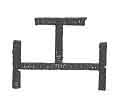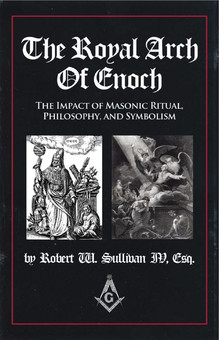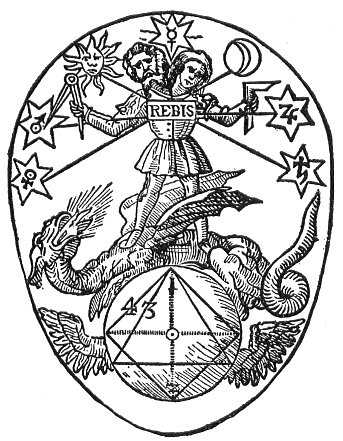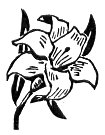p. 206
the general ignorance of the true nature and attributes of God, the proneness of the people of Judah and Israel to worship other deities, and the low and erroneous and dishonoring notions of the Grand Architect of the Universe, which all shared except a few favored persons; for even Solomon built altars and sacrificed to Astarat, the goddess of the Tsidunim, and Malcu_m, the Aamu_nite god, and built high places for Kamu_s, the Moabite deity, and Malec the god of the Beni-Aamu_n. The true nature of God was unknown to them, like His name; and they worshipped the calves of Jeroboam, as in the desert they did that made for them by Aaru_n.
The mass of the Hebrews did not believe in the existence of one only God until a late period in their history. Their early and popular ideas of the Deity were singularly low and unworthy. Even while Moses was receiving the law upon Mount Sinai, they forced Aaron to make them an image of the Egyptian god Apis, and fell down and adored it. They were ever ready to return to the worship of the gods of the Mitzraim; and soon after the death of Joshua they became devout worshippers of the false gods of all the surrounding nations. “Ye have borne,” Amos, the prophet, said to them, speaking of their forty years’ journeying in the desert, under Moses, “the tabernacle of your Malec and Kaiu_n your idols, the star of your god, which ye made to yourselves.”
Among them, as among other nations, the conceptions of God formed by individuals varied according to their intellectual and spiritual capacities; poor and imperfect, and investing God with the commonest and coarsest attributes of humanity, among the ignorant and coarse; pure and lofty among the virtuous and richly gifted. These conceptions gradually improved and became purified and ennobled, as the nation advanced in civilization–being lowest in the historical books, amended in the prophetic writings, and reaching their highest elevation among the poets.
Among all the ancient nations there was one faith and one idea of Deity for the enlightened, intelligent, and educated, and another for the common people. To this rule the Hebrews were no exception. Yehovah, to the mass of the people, was like the gods of the nations around them, except that he was the peculiar God, first of the family of Abraham, of that of Isaac, and of that of Jacob, and afterward the National God; and, as they believed, more powerful than the other gods of the same nature worshipped
p. 207
by their neighbors–“Who among the Baalim is like unto thee, O Yehovah?”–expressed their whole creed.
The Deity of the early Hebrews talked to Adam and Eve in the garden of delight, as he walked in it in the cool of the day; he conversed with Kayin; he sat and ate with Abraham in his tent; that patriarch required a visible token, before he would believe in his positive promise; he permitted Abraham to expostulate with him, and to induce him to change his first determination in regard to Sodom; he wrestled with Jacob; he showed Moses his person, though not his face; he dictated the minutest police regulations and the dimensions of the tabernacle and its furniture, to the Israelites; he insisted on and delighted in sacrifices and burnt-offerings; he was angry, jealous, and revengeful, as well as wavering and irresolute; he allowed Moses to reason him out of his fixed resolution utterly to destroy his people; he commanded the performance of the most shocking and hideous acts of cruelty and barbarity. He hardened the heart of Pharaoh; he repented of the evil that he had said he would do unto the people of Nineveh; and he did it not, to the disgust and anger of Jonah.
Such were the popular notions of the Deity; and either the priests had none better, or took little trouble to correct these notions; or the popular intellect was not enough enlarged to enable them to entertain any higher conceptions of the Almighty.
But such were not the ideas of the intellectual and enlightened few among the Hebrews. It is certain that they possessed a knowledge of the true nature and attributes of God; as the same class of men did among the other nations–Zoroaster, Menu, Confucius, Socrates, and Plato. But their doctrines on this subject were esoteric; they did not communicate them to the people at large, but only to a favored few; and as they were communicated in Egypt and India, in Persia and Phœnicia, in Greece and Samothrace, in the greater mysteries, to the Initiates.

Moe is the founder of GnosticWarrior.com. He is a father, husband, author, martial arts black belt, and an expert in Gnosticism, the occult, and esotericism.






![How the same Aidan, by his prayers, saved the royal city when it was fired by the enemy [Before 651 A.D.] | Book 3 | Chapter 16 How the same Aidan, by his prayers, saved the royal city when it was fired by the enemy [Before 651 A.D.] | Book 3 | Chapter 16](https://www.gnosticwarrior.com/wp-content/plugins/contextual-related-posts/default.png)